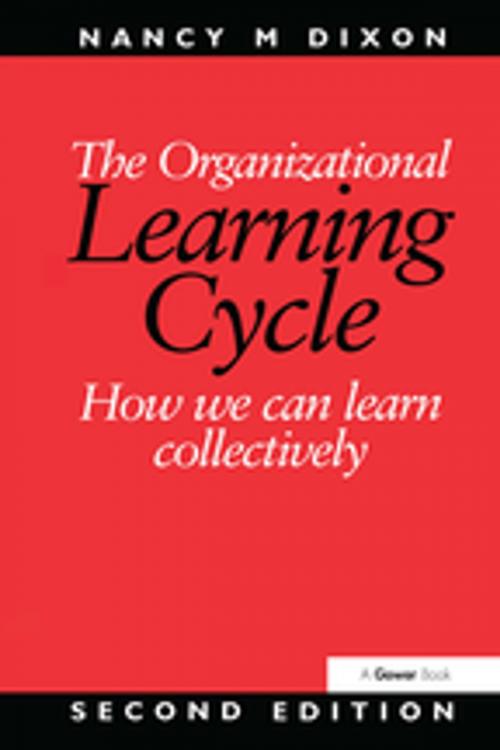The Organizational Learning Cycle
How We Can Learn Collectively
Business & Finance, Management & Leadership, Management| Author: | Nancy M. Dixon | ISBN: | 9781317022145 |
| Publisher: | Taylor and Francis | Publication: | July 5, 2017 |
| Imprint: | Routledge | Language: | English |
| Author: | Nancy M. Dixon |
| ISBN: | 9781317022145 |
| Publisher: | Taylor and Francis |
| Publication: | July 5, 2017 |
| Imprint: | Routledge |
| Language: | English |
The Organizational Learning Cycle was the first book to provide the theory that underpins organizational learning. Its sophisticated approach enabled readers to not only understand how, but more importantly why, organizations are able to learn. This new edition takes the original concepts and theories and shows how they might, and are, being put into action. With five new or completely revised chapters, Nancy Dixon describes the kind of infrastructure organizations need to put in place; there are examples of knowledge databases, whole systems in the room processes and after-action reviews originating from organizations that are making real progress with these ideas. A clearer relationship between organizational learning and more participative forms of organizational governance is drawn, along with responsibilities that employees need to take on to enable, and partake in, collective learning. With new case material from BP, the US Army, Ernst and Young, and the Bank of Montreal, for example, this book shows how you can make use of the collective reasoning, intelligence and knowledge of the organization and channel it into its ongoing and future development.
The Organizational Learning Cycle was the first book to provide the theory that underpins organizational learning. Its sophisticated approach enabled readers to not only understand how, but more importantly why, organizations are able to learn. This new edition takes the original concepts and theories and shows how they might, and are, being put into action. With five new or completely revised chapters, Nancy Dixon describes the kind of infrastructure organizations need to put in place; there are examples of knowledge databases, whole systems in the room processes and after-action reviews originating from organizations that are making real progress with these ideas. A clearer relationship between organizational learning and more participative forms of organizational governance is drawn, along with responsibilities that employees need to take on to enable, and partake in, collective learning. With new case material from BP, the US Army, Ernst and Young, and the Bank of Montreal, for example, this book shows how you can make use of the collective reasoning, intelligence and knowledge of the organization and channel it into its ongoing and future development.















